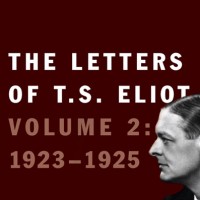Eliot Through His Letters, by Martin Lockerd.
Since the first volume of Eliot’s letters (1898–1922) appeared in 1988, scholars and enthusiasts waited impatiently for the Eliot estate to release a second volume. Though a British edition appeared in 2009, American readers were forced to wait still longer for the U.S. edition, which finally appeared in August of 2011. One benefit of the delayed arrival of the U.S. edition is that the letters themselves have already been reviewed by several prominent publications. Of course, this is a benefit chiefly in so far as it provides the opportunity for a much-needed corrective.
Anthony Julius’s piece for The Telegraph demonstrates the characteristic myopia of the reviews that sprang up in 2009. He finds little to like about the “distasteful” task of reading Eliot’s letters: “They tell us about the author, not about his writing. They are not an aid to understanding, certainly.” Though nearly every major critical work concerning Eliot’s verse makes useful reference to his correspondences, Julius finds them merely tedious. While this puts him in the company of those reviewers who regularly employ adjectives such as “painful” and “boring” when describing the reading process, it does him little credit. What is truly painful is the fact that many reviews of the letters fail to substantially address any but those letters directly quoted in the editors’ preface. The preface does give a well-constructed and succinct overview of the book’s contents, but many early reviewers cling to the overview and neglect the collection itself.
Julius does make one foray outside of the preface in order to bash Eliot as an anti-Semite, but he is so intent on grinding this worn-down axe that he overlooks the moments of true insight that leap up like a trout in the onrushing stream of the poet’s correspondence. The collection is admittedly awash with business mail that can be overwhelming. It is also, however, filled with truly poignant, interesting, and even funny moments that make the letters well worth reading. The exchange between Eliot and the writer/critic John Middleton Murry stands out as the most moving and emotional. Following the lead of the preface, many reviewers call attention to Eliot’s deeply confessional letters to Murry, which are filled with dark lines such as: “I have deliberately killed my senses—I have deliberately died—in order to go on with the outward form of living.” Eliot’s desperation grows as his wife’s mental and physical health languishes and deteriorates, and his fall into depression and despair evokes true pathos with seemingly little hope of catharsis.
Complete article in The University Bookman
